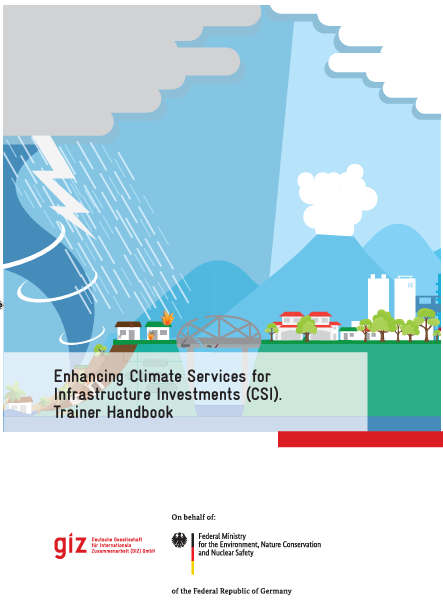Article /
Trainer Handbook | Enhancing Climate Services for Infrastructure Investments (CSI)

Course Overview
This resource was submitted by the Climate Risk Institute for use by the CanAdapt Climate Change Adaptation Community of Practice.
This article is an abridged version of the original text, which can be downloaded from the right-hand column. Please access the original text for more detail, research purposes, full references, or to quote text.
Infrastructure adapted to the impacts of climate change is one of the United Nations Sustainable Development Goals. A number of countries, including Brazil, Costa Rica and Viet Nam, have already launched efforts to increase the resilience of their infrastructure and have included infrastructure climate risk management in their National Adaptation Plans (NAP). For implementing their NAPs, the partner countries’ are required to establish Climate Services that are aligned to the requirements of decision-making and planning processes. A few international initiatives have begun to address this challenge, including the Global Framework for Climate Services (GFCS). The GIZ-CSI project translates the international framework of action of the GFCS into national level contexts and conditions in its partner countries and focuses on Enhancing Climate Services for Sustainable Infrastructure Investment (CSI).
It supports the country-specific institutional and technical design of structures to enable countries to make better use of Climate Services and to include them in their infrastructure planning system. This includes institutionalizing a sustainable interface between users (e.g. infrastructure planners, operators and owners) and Climate Service providers – commonly referred to as a Climate Service User Interface Platform (UIP). It promotes the concept of co-production of Climate Service products. This means including users of Climate Services right from the beginning in the development process of Climate Service products to become tailormade. Moreover, CSI also focuses on climate-sensitive infrastructure planning methods. Together with decision-makers, the project develops recommendations for adapting planning procedures and regulations in line with the climate-proofing approach, e.g. via cost-benefit analyses, the development of building standards or environmental impact assessments (EIA).
Based on the Public Infrastructure Engineering Vulnerability Committee (PIEVC) protocol that Engineers Canada developed to analyze climate risks to infrastructure, the project aims to build local capacity by means of a learning-by-doing approach. With support of NIRAS – IP Consult GmbH the CSI Training was developed and to disseminate this approach and to operationalize the adapted planning procedures and regulations following the Climate Proofing method originally developed by GIZ based in the Guidelines Integrating Climate Change Adaptation into Development Cooperation (OECD 2009). One essential component of the capacity development approach of the CSI project is training and ensuring that training capacities in the CSI partner countries are locally enhanced and sustained. Trainings are envisioned to accompany and complement activities of the project related to enhancing Climate Service provisions and their utilization for infrastructure investments. This specifically refers to the development of training approaches that are complementing learning experiences from selected infrastructure pilot activities focusing on the Climate Proofing of ports and transition lines (Brazil), bridges (Costa Rica), sluice gates (Viet Nam) and dams (Ethiopia-NBI).
By the end of this course, users will:
- understand the concept of Climate Services and engineering aspects of risk assessment,
- learn about a more technical approach towards cost benefit analysis,
- know how to identify potential entry points of climate change adaptation within infrastructure planning frameworks and cycles using the Climate Proofing method, and
- be able to provide feedback to policy development and integrate the results of climate proofing infrastructure investment into the context of NAP/ NDC- implementation, institutional reform and other enabling mechanisms for change.
- become aware of challenges and enabling factors for the effective use of Climate Services in the context of Climate Proofing infrastructure investment;
- learn to think in systems and understand in this context the importance of climate value chains and Climate Service products for climate change adaptation which involves the technical, organizational and institutional levels;
- become aware how to balance interests of different stakeholder groups; be able to reflect on applying Climate Proofing infrastructure investment projects, strategies and plans in their own specific contexts.
The trainings are designed for practitioners, technical staff and decision makers responsible for the provision of Climate Services, and planning and implementation of infrastructure investment, such as Hydro-Meteorological Institutes, line ministries, academia, private infrastructure investors, and engineering organizations.
All trainings are based on the Harvard Case Methodology, which conveys teaching messages mainly through interactive practical work by participants. The Trainings include exercises using a fictitious situation closely based on real life conditions and challenges. Experiences drawn from actual CSI’s descriptions enrich the trainings by providing concrete examples and showcasing how solutions can work in reality. All training course and exercise can be adapted to different demands and contexts.
All courses are designed for 3 to 5 days and can be delivered in English, Spanish, Vietnamese, and Portuguese.
Suggested Citation:
‘Enhancing Climate Services for Infrastructure Investments (CSI). Trainer Handbook,’ (2019), GIZ & BMU.
- Climate Change: From Learning to Action Online Course
- Tandem: online guidance for the co-design of climate services
- A Practical Guide to Climate-resilient Buildings and Communities
- Green Infrastructure in Urban Centres: Policy, Design and Practice
- Intro to Climate Policy for Climate Adaptation Professionals
- Strategic Dialogue and Engagement for Climate Adaptation
- Training Guide: Climate Change Adaptation Project Preparation
